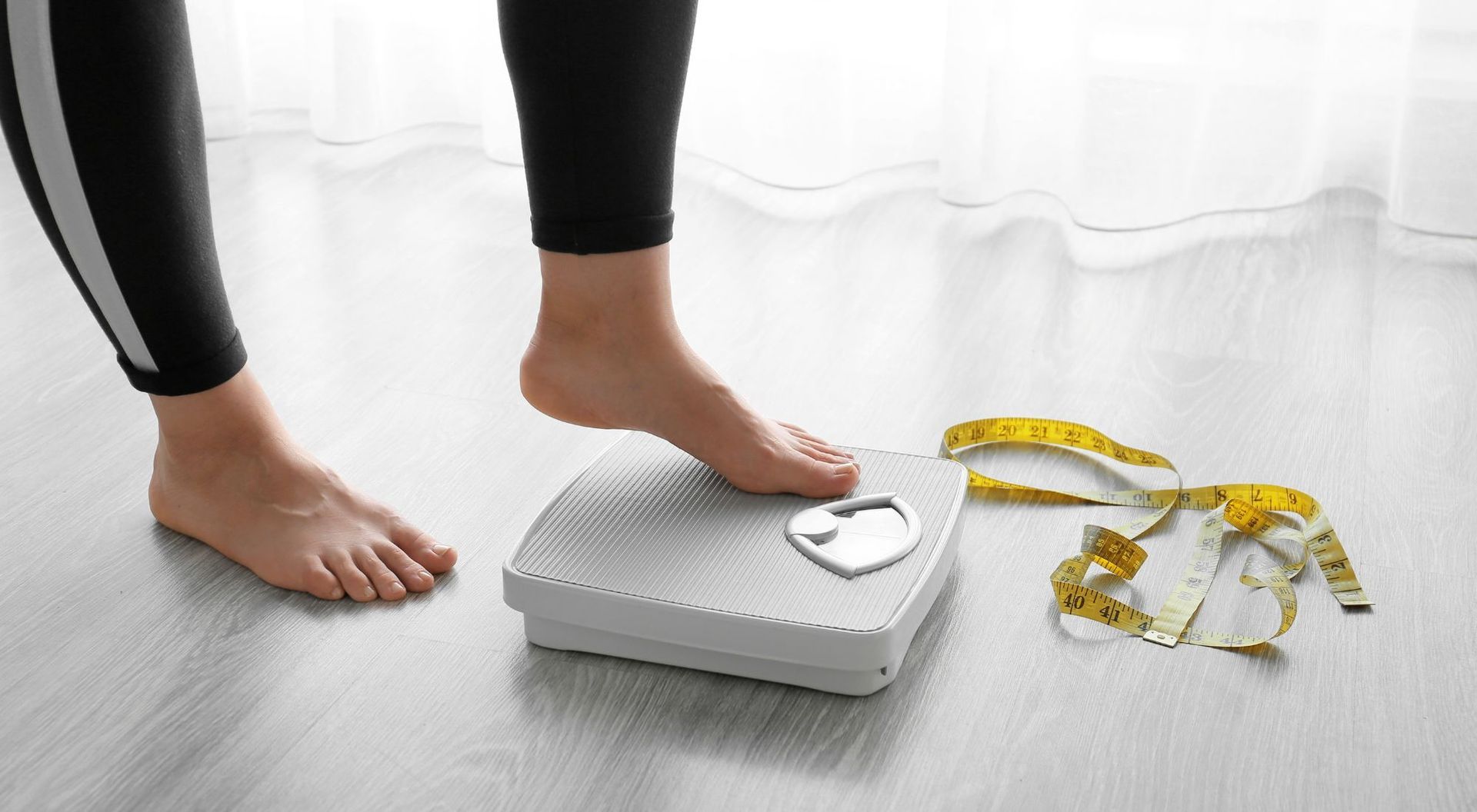Navigating Thyroid Issues on the Path to Weight Loss: Strategies and FAQs
"The content below is not intended to be a substitute for professional medical advice, diagnosis, or treatment. Always seek the advice of your physician or other qualified health provider with any questions you may have regarding a medical condition."
Things are changing. You notice your belly poking out a little more than it used to. Your pants are getting a little too tight. And those thighs — have they always looked like that?
Gaining weight can happen for a lot of reasons, and many of them are out of our control. However, weight gain is often a symptom that is associated with thyroid disorders, meaning that gaining weight is easy, but losing it may not be.
If you deal with thyroid issues and are starting to notice those tell-tale signs that you’re putting on extra weight, don’t despair. There are practical ways you can combat weight gain.
To know how to lose weight with a thyroid issue, we’ve created this guide to:
- Reveal the connection between thyroid issues and weight gain
- Explain why thyroid issues may lead to weight gain
- Share eight strategies to help get the weight off
Table of Contents
What Is the Relationship Between Thyroid Disorders and Weight Gain?
The first thing to understand is not all thyroid disorders are the same. Some may lead to weight gain, and some may not.
The two most common thyroid disorders are hypothyroidism and hyperthyroidism.
With hypothyroidism (and Hashimoto’s), the thyroid does not produce enough thyroid hormone. With hyperthyroidism (and Grave’s Disease), the thyroid produces too much thyroid hormone. Typically, weight gain is common with hypothyroidism but not with hyperthyroidism.
Even though metabolism is complex, and many other factors can affect it, there is an interesting relationship between basal metabolic rate (BMR) and thyroid disease.
Since the thyroid is involved in regulating metabolism, people with hyperthyroidism tend to have a higher basal metabolic rate (BMR). Hypothyroidism patients tend to have a
lower BMR, which means people with hypothyroidism may not metabolize nutrients as easily as others and may gain weight. According to this study, hypothyroidism can lead to a
50% loss in metabolism.
Why Do Thyroid Issues Cause Weight Gain?
BMR may not be the only connection between thyroid issues and weight gain. The following may also be contributing factors:
- An imbalance of the hormones T3 and T4 may lead to a buildup of salt and water in the body, leading to weight gain from fluid retention. An accumulation of hyaluronic acid and a decreased renal flow can also lead to water retention in hypothyroidism patients.
- T3 and T4 imbalances may also affect other hormones, like leptin, ghrelin, insulin, and cortisol — all related to metabolism. With lower levels of T3 and T4 in the body, it’s more difficult for your body to burn calories, which may lead to weight gain.
- Slow peristalsis may also be a symptom of hypothyroidism. This can cause constipation, which may lead to weight gain.
- A common symptom of hypothyroidism is tiredness or fatigue. When you’re tired, you may be less likely to exercise, which may inhibit weight loss.
- When we are tired, we tend to crave sugar because of the quick pick-me-up it provides. Turning to sugar rather than healthier options can lead to weight gain.
For help in making better nutritional and lifestyle decisions to positively impact your health, turn to Dr. Donna Sergi and HealthierU. Dr. Sergi is committed to a
natural treatment for hypothyroidism along with a holistic approach. Get started today by scheduling a free consultation.
Can You Still Lose Weight With Thyroid Problems?
Yes, you can lose weight even if you’ve been diagnosed with thyroid disease. Thyroid issues may make it easier to gain weight and harder to lose weight, but it is not impossible.
Educating yourself is the first step in your journey to lose weight.
When you better understand how your body functions and how an underactive thyroid affects the systems and processes of the body, you’ll be better equipped to know how to make healthy diet and lifestyle choices.
Yes, challenges exist for those with hypothyroidism, but they aren’t insurmountable.
How To Lose Weight With Thyroid Issues: 8 Strategies That May Help You Lose Weight
Learning how to lose weight with thyroid and hormone issues involves more than just the food you eat. Managing weight while also managing your thyroid condition may also involve other things, such as:
- When you eat
- How often and how much you eat
- Hydration
- Exercise
- Sleep
- Supplementation
- And more
#1: Ensure You Are Consuming the Appropriate Nutrients
Even though there’s no “official” hypothyroidism diet, there are recommendations on what you should eat and what you should avoid. The double benefit of healthy hypothyroidism nutrition is that you’ll likely help your thyroid function and lose weight.
First, let’s discuss what you should eat.
Implement a diet which includes:
- Fiber-rich foods like whole grains, berries, beans, and vegetables. High-fiber food can help by:
- Keeping bowel movements regular, avoiding constipation.
- Making you feel fuller, faster.
- Controlling blood sugar.
- Plenty of fruits and vegetables because they are lower in calories and can potentially slow the progression of thyroid disease.
- Eating high-quality proteins — fish, eggs, poultry — to help increase metabolism and decrease hunger.
- Healthy fats, like salmon, chia seeds, avocados, and walnuts. These foods can aid in the feeling of fullness and some contain selenium, which is essential for thyroid function.
#2: Avoid Thyroid-Disrupting Foods
Though considered part of a healthy diet, there are some foods that may contribute to lower thyroid function.
Certain vegetables, fruits, grains, and nuts contain goitrogens, which are chemicals naturally found in many plant-based foods. Goitrogen-containing foods can make it difficult for your body to use iodine, affecting thyroid function.
Consider limiting these foods that contain goitrogens:
- Cruciferous vegetables
- Spinach
- Kale
- Cabbage
- Cauliflower
- Broccoli
- Brussels sprouts
- Lima beans
- Cassava
- Sweet potatoes
- Peaches
- Peanuts
- Millet
It may also be recommended to limit soy because it can interfere with the absorption of thyroid medication. Additionally, if you’re taking thyroid medications, it’s advised to take those medications on an empty stomach.
Limiting alcohol consumption is also a good idea because it may make your water retention worse and further disrupt your hormones.
#3: Stay Well-Hydrated
Whether you have a thyroid condition or not, staying well-hydrated is a key component of losing weight. Here are a few reasons why:
- Drinking plenty of water helps with metabolism.
- You may find you have a less ferocious appetite when you stay hydrated.
- Drinking adequate amounts of water helps in digestion and elimination.
- Being hydrated helps maximize exercise efforts.
- Hydration helps to flush out excess sodium, helping with fluid retention and bloating.
A study of female participants whose water intake was increased for eight weeks reported a reduction in each of the following parameters:
- Body weight
- BMI (body mass index)
- Appetite score
- The sum of skinfold thickness
Drinking water is simply good for you. Everyone is different, and optimal water intake for each person may vary. However, it’s generally
recommended for healthy adults to drink anywhere from 11.5 to 15.5 cups of water per day.
#4: Adjust When and How Much You Eat
When you have thyroid issues and are trying to lose weight, merely eating the
right
things may not be enough.
When you eat and how much you eat are key aspects you should also take into consideration.
Timing of Meals
Recent studies have shown that altering the time of meals may assist in weight loss. This study found that “food timing may affect other circadian-related variables that can predict weight loss.”
A popular meal-timing approach is intermittent fasting. After fasting for a period of time, the body uses up its stores of sugar and starts burning fat. Intermittent fasting gives the body a longer period of time to burn through the calories from the last meal and then begin burning fat.
Another option is to eat five to seven times a day — usually three small meals and two to three small snacks. Eating smaller meals more often throughout the day may help:
- Control metabolism
- Fend off hunger
- Control blood sugar
Calorie Intake
Again, every individual is different, and recommended calorie intake may vary depending on:
- Physical activity
- Age
- Genetic factors
- Disease
Even though intake levels may vary among individuals, staying within your particular recommended range may help to manage weight.
Understanding this, the FDA recommends the following:
- 1,600 to 2,400 calories/day for women
- 2,000 to 3,200 calories/day for men
It’s clear how eating too much can be a stumbling block to weight loss, but eating too little can also pose problems. When you don’t eat enough, your body may go into starvation mode and start using muscle for energy instead of fat. You also won’t get the necessary nutrients you need for good health. Undereating can also lower your resting metabolic rate, resulting in fewer calories burned throughout the day.
When it comes to diet, it’s always a good idea to talk to your healthcare professional before starting a new regime. This is exactly what we do at
HealthierU. Dr. Sergi works with each patient to customize a plan that includes diet, lifestyle, and supplement advice to help their body function as optimally as possible.
#5: Work on Your Sleep
You know the drill. The alarm goes off after a night of insufficient sleep. After snoozing the alarm a few times, you finally pull yourself out of bed, drink some coffee, and get ready for the day. At 10:00 am, you drink more coffee and eat the last donut in the break room. You make another bad choice at lunch and must have another cup of coffee in the afternoon just to make it through the afternoon without falling over.
Sleep is foundational for function, but did you know that how many Z’s you catch doesn’t just impact your ability to withstand daily annoyances (without being extremely cranky or a fish bowl of coffee)? Studies show that sleep may positively influence weight loss endeavors.
Lack of quality sleep can affect weight gain because of the number it does on our brains in these two ways:
- Insufficient sleep slows the brain’s activity in the frontal lobe, leading to bad decision-making and decreased impulse control. A tired brain is more likely to choose high-carb and high-fat foods and eat larger portions than usual, as studies show.
- When you don’t get enough sleep, a spike in cortisol (stress hormone) occurs. Higher levels of cortisol signal your body to conserve energy, which may mean weight gain in the long run. Research found that even with the same number of calories, the amount of weight sleep-deprived dieters lost from fat decreased by 55%.
If sleep evades you, try making some of the following changes to get more shut-eye:
- Go to bed around the same time every night.
- Keep your bedroom dark and cool at night.
- Remove electronic devices from your room.
- Avoid alcohol, caffeine, and large meals too close to bedtime.
#6: Exercise
It’s simple — physical exercise burns calories, and when you burn more calories than you consume, you can expect to lose weight.
If you want to know how to lose weight with thyroid issues, try exercises/activities like the following:
- Walking
- Swimming
- Water aerobics
- Cycling
- Yoga
- Strength training
#7: Talk to Your Healthcare Provider
You may find it difficult to lose or maintain weight if your thyroid issue is undertreated. Your physician is a key voice to help you know how to manage both your thyroid condition and your weight.
Your doctor will likely order some blood work to measure TSH, T3, and T4 levels. They may request other types of lab work also to get a comprehensive look at your condition. After a thorough exam, your physician may do the following to treat your thyroid issue and help with weight gain:
- Prescribe medication like levothyroxine
- Refer you to a dietician for nutritional consultation
- Suggest supplements
- Recommend an exercise program
#8: Consult a Nutritional Expert
Losing weight with hypothyroidism can be hard.
You may often feel misunderstood or unseen by medical professionals and constrained by societal expectations to look a certain way or weigh a certain amount.
A nutritional expert on weight loss and thyroid issues (like HealthierU) may offer a holistic solution that might help you treat your thyroid symptoms while offering empathy and support.
HealthierU: How To Use Nutrition To Empower Your Weight Loss Journey in the Face of Thyroid Issues
Whether you’re experiencing weight gain with your thyroid issue or not, HealthierU can help you manage both with a holistic approach.
We know our bodies are multifaceted, so we focus on treating hypothyroidism with a whole-person perspective.
After a thorough consultation, Dr. Sergi will work with you to customize a holistic nutritional plan that includes diet and nutrition guidance, lifestyle modifications, and whole-food supplement recommendations.
Contact HealthierU today for a free consultation and enjoy optimal living, even with a thyroid disease.






